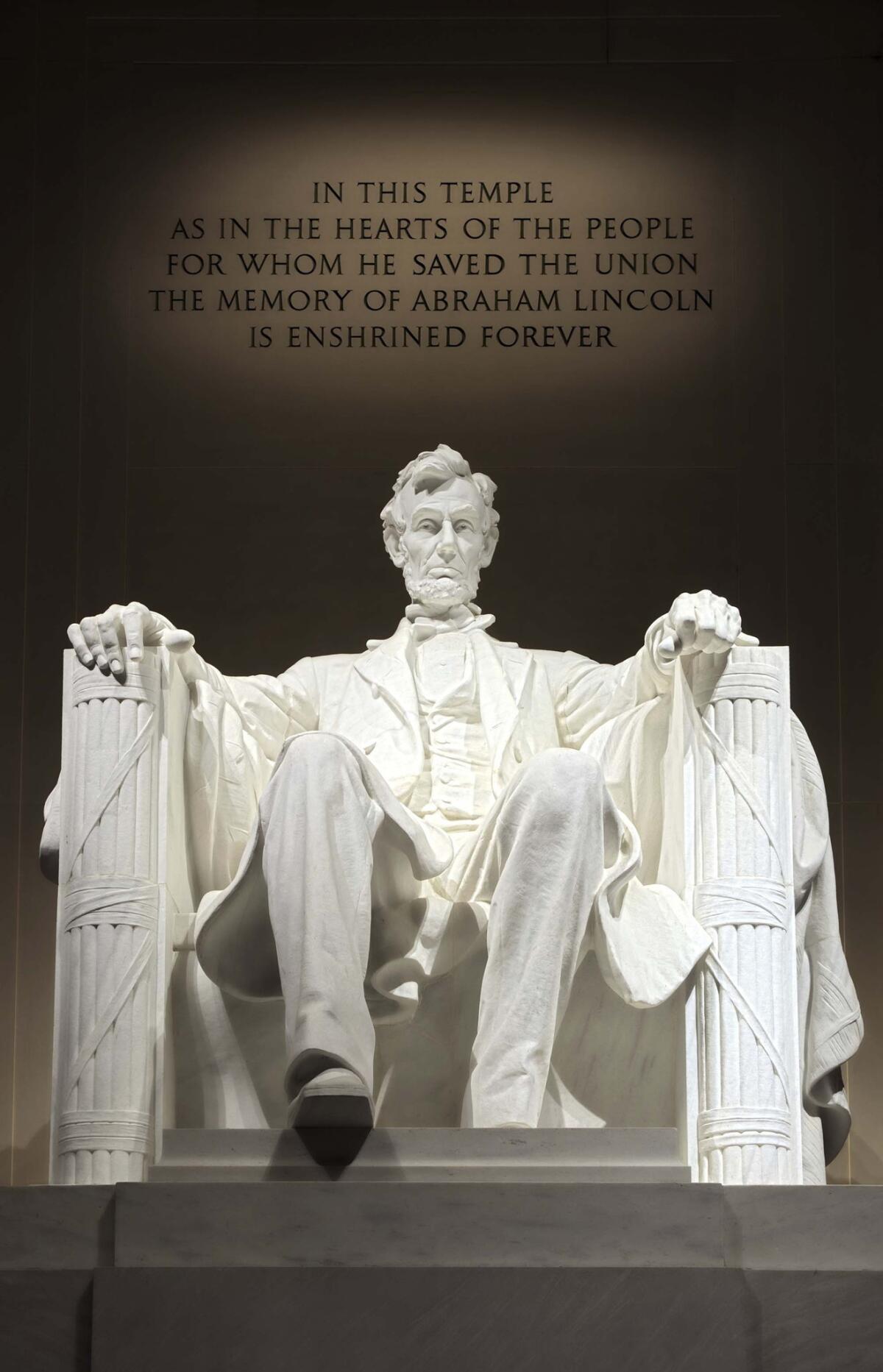Op-Ed: Trumpâs comments about Lincoln arenât unusual â Civil War references are common in tumultuous times

President Trump claimed during Thursdayâs debate that no one had done more for the Black community than he had, with Abraham Lincoln being a âpossible exception.â Former Vice President Joe Biden spoke at Gettysburg and recalled Lincolnâs famous address. A prominent group of Republican opponents to Trump call themselves the Lincoln Project. A nationwide debate rages over Civil War statues. Political commentators on the left and the right urge the country to return to the âbetter angels of our natureâ â an evocative phrase from Lincolnâs first inaugural address.
The Civil War, which ended formally 155 years ago, is forever with us â especially in this year of contention and conflict.
Five years ago, historians and civic leaders worked to create memorable commemorations to mark the sesquicentennial of the Civil War and the peace that began at Appomattox Court House in Virginia. Their efforts produced reenactments, documentaries and books â but little public resonance.
Now, four years into the Trump era, with commentators debating whether American democracy is in peril, the Civil War has roared back into prominence. Indeed, the contemporary public debate is punctuated by a phrase from the Gettysburg Address: the hope â the imperative â that âgovernment of the people, by the people, for the people, shall not perish from the earth.â
âThe war is on the radar screen in a way it hasnât been for years,â said Jay Sexton, a professor of history at the University of Missouri. âOne of the reasons may be that the implications and consequences of the Civil War â the search for social justice and racial equality â are with us forever.â
Indeed, the Civil War, by far the deadliest conflict in American history, has more symbolic resonance than perhaps any American military action.
During the late 19th century, Republicans often were accused of âwaving the bloody shirtâ â in short, exploiting the memory of the Civil War for partisan advantage â in presidential campaigns. Throughout the Great Depression, Democrats invoked Lincoln in an effort to deride the Republicans they blamed for the nationâs economic distress. During the 1932 presidential race, political strategists for Franklin D. Roosevelt â who had asserted that it was time for âus Democrats to claim Lincoln as one of our ownâ â contemplated holding a campaign event at Lincolnâs tomb.
Six years later, at the 75th anniversary of the Battle of Gettysburg, FDR told more than 250,000 people, including nearly 2,000 Civil War veterans, that âthe fullness of the stature of Lincolnâs nature and the fundamental conflict which events forced upon his presidency invite us ever to turn to him for help,â arguing that the questions of freedom prompted by the Civil War âwill be the continuing issue before this nation so long as we cling to the purposes for which the nation was founded.â
Gettysburg has been a magnet for important speeches during tumultuous times.
In 1963, Vice President Lyndon B. Johnson traveled to the Pennsylvania battlefield and declared, âOne hundred years ago, the slave was freed. One hundred years later, the Negro remains in bondage to the color of his skin.â The speech is credited with nudging President John F. Kennedy to deliver his strong civil rights speech two weeks later, when he argued, âOne hundred years of delay have passed since President Lincoln freed the slaves, yet their heirs, their grandsons, are not fully free.â
The latest American politician to address constituents at Gettysburg is Biden, who this month quoted Lincolnâs words portraying the country as âa house divided,â adding, âBut that, my friends, can no longer be. We are facing too many crises; we have too much work to do.â
At the same time, a group of Republicans calling themselves the Lincoln Project have become a leading anti-Trump political action committee. The group, dismissed by the president as the âLosers Project,â cites Lincoln for leading the nation âthrough its bloodiest, most divisive and most decisive period of our history,â asserting, âToday, we find ourselves divided again â sectionalism in the country and factionalism in government has led to ever uglier examples of how our political system is failing.â
The 16th president provides a touchstone for this troubled era. âHis words âwith malice toward none; with charity for allâ can offer us some hope for unity, amnesty and brotherhood and a balm for healing our wrenching divisions,â said Susan Dunn, an FDR scholar at Williams College.
Today, those worried about the erosion of democratic principles or concerned about the peaceful transfer of power after the 2020 election often cite worries about a new âcivil war,â perhaps as a metaphor in the nationâs political conversation, more ominously as a tragic reality of violence in the streets. But that worry â and the repeated fitting of contemporary politics into a Civil War framework â only serves to remind us of the stakes of current issues.
âWhen basic political values are contested, we are in times when the Civil War and Americaâs greatest champion of democracy have the most attraction,â said Sexton.
That is true, but it may only be when the promise of America is fully realized that we may not need Lincoln, or the Civil War, the way we need them now.
David M. Shribman teaches U.S. politics at Montrealâs McGill University.
More to Read
A cure for the common opinion
Get thought-provoking perspectives with our weekly newsletter.
You may occasionally receive promotional content from the Los Angeles Times.










